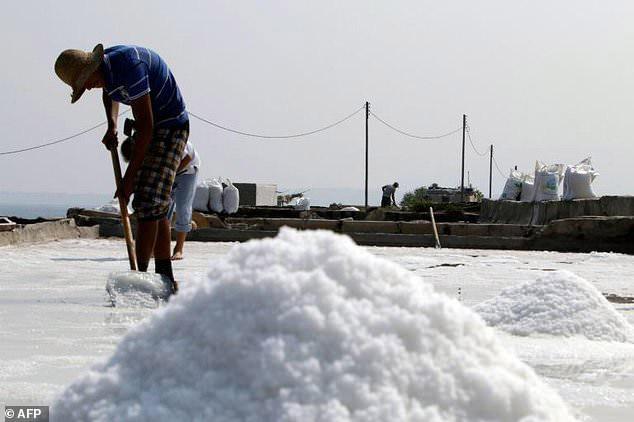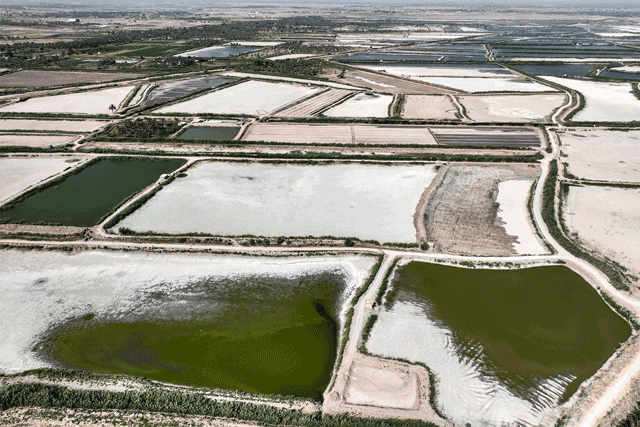You are here
In Lebanon, salt producers fear craft is drying up
By AFP - Aug 19,2017 - Last updated at Aug 19,2017

Traditional coastal salt production was once popular in Lebanon, but the fully artisanal practice now survives in just a single seaside town, Anfeh, around 70 kilometres north of Beirut (AFP photo)
ANFEH, Lebanon — At 93, Elias Al Najjar has spent half a century harvesting salt by hand from ponds on Lebanon's Mediterranean shore, but he and his colleagues fear their way of life is dying.
Traditional coastal salt production was once popular in Lebanon, but the fully artisanal practice now survives in just a single seaside town, Anfeh, around 70 kilometres north of Beirut.
Producers like Najjar say the sector has suffered a series of blows, from an exodus of pond owners during Lebanon's civil war, to the lifting of import tariffs.
"I used to produce 300 tonnes myself in the 1950s," the elderly man says.
"Now I make 30 tonnes maximum."
Anfeh's salt producers accuse the government of refusing them permits to repair their equipment in order to turf them off prime coastal real estate and make way for developers.
"If they can't destroy the ponds, they want to make them unworkable so it's easier for fat cats to buy them to build resorts," says Hafez Jreij, 67.
"The land the ponds are on is going to be handed over to developers who want to build beach resorts."
The municipality confirmed to AFP that the central government is not giving any more permits.
But municipal spokeswoman Christiane Nicolas said the local council has no desire to destroy the sector.
"The government stopped collecting taxes on traditional salt production because it considered it an infringement on public property," she told AFP.
But she added: "There's no evidence the authorities want to hand over the coast to developers."
Seasonal process
Salt extraction is a time-consuming process subject to the vagaries of weather, meaning it can only be practised around four months a year.
First, sea water is drawn into metre-deep concrete ponds via pumps powered by small windmills.
The water sits in the ponds of up to 20 square metres for at least 20 days, evaporating to leave a salty liquid residue.
That salty water is then swept into shallower concrete pans, and left to concentrate further for another 10 days.
Setbacks
Each day, producers sweep the sea water across the pan to ensure it dries evenly.
As the liquid disappears, blindingly white salt crystals emerge in lines, twinkling in the sunlight.
Jreij says Lebanon's traditional salt industry produced 50,000 tonnes a year during the sector's heyday between 1955 and 1975.
"Lebanon did not need to import salt, and the state imposed a 200 per cent tax on salt imports," he says.
But from 1975, when Lebanon's 15-year civil war erupted, the industry began suffering a series of setbacks.
Many pond owners were among the Lebanese who fled in waves over the years of the grinding conflict.
With their departure, production started to fall below demand, prompting the government in the 1990s to lift the import tax on foreign salt.
The decision made it hard for local producers to compete and, with the sector in free-fall, the government announced it considered many of the salt pans to be illegal construction on public coastline.
As a result, it stopped taxing income from salt production in 1994.
And without tax receipts, municipalities started rejecting permit applications from producers to maintain their equipment, producers say.
Those refusals prevent repairs on worn-down infrastructure, thereby killing the industry, they complain.
Jreij estimates half of all the salt pans in Anfeh are now unusable as a result of the 1994 decision.
Scraping by
Jreij also said that local authorities tried to shut him down in 2015 and 2016 by claiming the sea water feeding the ponds was contaminated.
"We did laboratory tests on the water at extraction points and they all conformed to safety specifications," Jreij says.
Najjar, who said he had had a similar problem, showed to AFP the analysis results, carried out in Lebanon.
For now, producers in Anfeh are scraping by, selling salt to individual and industrial buyers at a rate of between $2-4 per kilogramme, much less than the price of imported salt.
Bigger battle
Fisherman Daniel Fares, 37, says he is a loyal customer of Jreij because the entire production process is transparent.
"The sea is clean, and you know where the salt is coming from," he tells AFP.
"I prefer it over imported salt because it has no additives, which makes it suitable for pickling sardines too," says Fares, who also sells some of Jreij's salt to his own customers for home use.
Jreij sees the fight to preserve the salt ponds as part of a greater battle to protect Lebanon's coastline, much of which has been gobbled up by developers.
"Salt ponds don't produce waste, they don't block the way to the sea, and they don't block the beautiful view of the Mediterranean," he says.
"Resorts do all of that."
Related Articles
BEIRUT — Lebanon on Monday urged Saudi Arabia to rethink a ban on Lebanese fruit and vegetable imports, a day after the suspension came into
BEIRUT — Lebanese soldiers renewed fire on the Daesh extremist group positions on the country's eastern border with Syria on Sunday after ca
AL-BU MUSTAFA, Iraq — Iraqi villager Omar Ziad gazes at the cracked and barren earth where his fish farm once stood, lost to water conservat
















